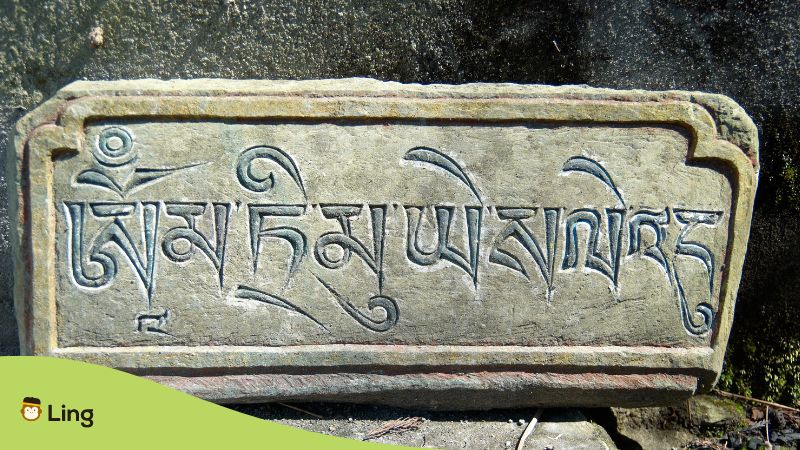Have you ever heard of the tales from the Himalayas, or poetic renditions capturing the essence of Nepali life? These unique aspects to the Nepali language easily tempt people who adore learning new languages. If you’re new to this lexicon, you might want to consider learning simple Nepali words to read first.
Nepali is a rich language with a blend of culture and history. And guess what? Just by understanding a few simple words, you can dive deep into the heart of Nepali culture. Intrigued? Let’s journey together!
However, before you even jump onto this ship, it’s best if you’re already familiar with the script used to create every Nepali word. They may be basic words, but understanding their alphabet is the key to fully understanding a new language. Anyhow, I won’t keep you waiting— buckle up as we’re about to introduce simple Nepali words to read for beginners.

List of Easy and Simple Nepali Words to Read
Originating from the majestic Himalayan region, Nepali boasts a unique melange of influences from its neighboring countries, India and Tibet. Imagine a language, like a river, carrying with it bits and pieces from various cultures, yet maintaining its distinct flavor. That’s Nepali for you.
Visually stunning, the Devanagari script used for Nepali is a work of art. It’s the same script as Hindi, which means if you’ve dabbled in Hindi before, you’ve got a head start. Ready to begin your first words in Nepali? Proceed and make sure to take notes!
1. Namaste (नमस्ते)
Ever walked into a room and felt an instant connection? That’s the magic of “Namaste.” It’s more than just a greeting. It’s an acknowledgment of the soul in one by the soul in another. A simple bow of the head and you’ve conveyed respect, warmth, and hospitality. Anyhow, it becomes one of the simplest words to read in Nepali because it’s universally known by most people. While the script itself is quite distinctive making it easier for new learners to identify this word.
2. Pani (पानी)
This Nepali word is pretty simple the moment you look at its Roman translation. Once the word escapes your lips, you’d realize how easy it is for it to roll off your tongue. Anyhow, this term simply refers to “Water.” So, whenever you feel thirsty, don’t forget to get yourself a glass of Pani (पानी)!
It only has two syllables and yet it encapsulates so much. There’s beauty in brevity, and “Pani” is a shining example of that. Our minds also love patterns and familiar sounds. And that’s why with this word’s phonetic structure it feels so comfortable to many of us.
3. Aakash (आकाश)
Ever come across a word in a different language that just seems… friendly? That’s the feeling many get with “Aakash” (आकाश). Representing the vast “sky” above us, the term resonates because of the universality of the sky – it’s something we all look up to, no matter where we are. But it’s not just the meaning. Phonetically, “Aakash” rolls off the tongue smoothly. The way it’s spelled also mirrors how it’s pronounced, eliminating any guesswork.
4. Baato (बाटो)
Some words are really capable of bringing comfort. In this blog post, “Baato” (बाटो) is one of the many terms that offer this feeling. While it translates to “path” or “road” in Nepali, there’s a certain simplicity to it. It’s short, snappy, and phonetically clear, making it a breeze to pronounce. Moreover, it has a mix of phonetic simplicity and universal relatability making “Baato” pleasantly easy on the ears and mind.
5. Maya (माया)
There are certain words that can easily make you feel warm, and “Maya” (माया) is one of them. Well, how can you not feel this way if it means “Love” or “Affection” in English? The way you say it comes with a soft, flowing sound, it’s like a gentle caress, making it easy to pronounce and remember. And really, who doesn’t resonate with love? Regardless of language or culture, the feeling of “Maya” is something we’ve all experienced, making the word familiar and comforting at its core.
6. Dost (दोस्त)
Do you remember that friend who’s always been there for you? You may call them Dost (दोस्त) in Nepali. It’s one of the simplest words to read thanks to its easy pronunciation. See that one-syllable word? You won’t have a hard time remembering it!

Tips To Pronounce Nepali Words
If you really want to speak Nepali and pronounce words like a pro, then you’ll need to learn the basics of the language. There are common words and phrases that can easily help you have a smooth time on this fun journey.
1. Start With Common Phrases & Words
Instead of jumping right into the essential Nepali words, it’s best to first stick with the basics. There are a lot of basic phrases that you can practice on, like greeting such as good morning, hello, and thank you. Once you familiarize yourself with these words you eventually build confidence.
2. Listen Actively
Exposing yourself more to Nepali media is one way to learn their pronunciation. You get to track the rhythm, tone, and intonation of words as you also satisfy your personal interest. Note that these media may vary from songs, podcasts, and movies!
3. Practice With Native Speakers
There are several ways to connect with native speakers without having you book a flight just to visit Nepal and have a conversation with locals. Online platforms like Tandem and HelloTalk can easily help you find someone who can teach you how to speak Nepali. Although this must be a two-way agreement as the latter may want to learn your native language. Anyway, this method is useful because you get to have real-time feedback and you get more exposed to the unfiltered expressions of Nepali people.
4. Use Language Apps
If you’re too shy to find friends who can help you improve your Nepali vocabulary and pronunciation, you can always resort to apps like Ling, Duolingo, and Drops. There are plenty more options out there, but overall, they generally provide pronunciation exercises that can help new learners easily verbalize different Nepali phrases.
Want To Learn More About Nepali Language? Get Ling Today!
Did you get what it’s like to study the Nepali language? If you’re planning on visiting Nepal, these few words aren’t enough ammunition for your trip. However, do you want to hear the great news? Ling is here to guide you from start to finish!
If you’re someone who likes structured lesson plans, then you’d love how they introduce the most basic words first down to the most complex phrases. While you also have 60+ languages to choose from, so you could always explore more whenever you get bored. Speaking of boredom, do you love challenges? Go ahead and answer different strop your skills! Download Ling today on Play Store and App Store for FREE!

































































